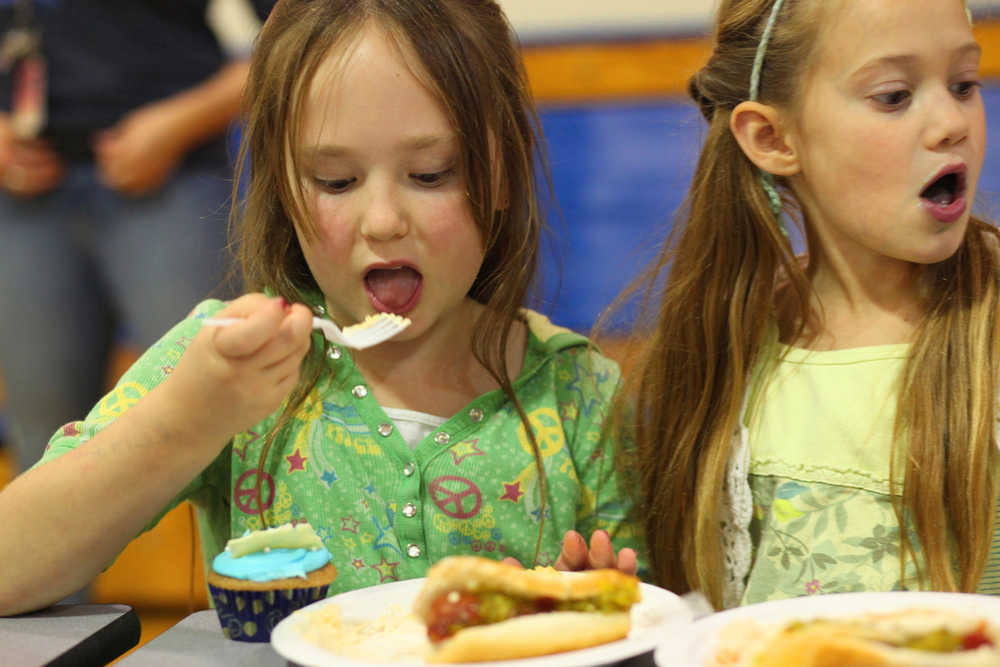Soldotna Montessori students reaped the fruits of nearly a year’s worth of labor, in the form of nearly 2,000 purple, red and yellow potatoes.
More than 320 pairs of hands pulled the thousands of bulbous, hearty tubers from cold garden soil on Sept. 14, in a matter of hours. The generous yield was then prepared and put onto the tables of the school’s families Sept. 18, at the annual Peace Day Harvest potluck.
“So at our school we believe that student-driven ideas are the best way to go about it,” said fourth-, fifth- and sixth-grade Montessori teacher Terri Carter.
In the winter of the 2014-2015 school year, 12 students formed the Garden Task Force. The group began by identifying the best site, with the most light, for seven 4-foot-wide by 12-foot-long, 18-inch-high raised beds, Carter said.
“Kids had started to express interest in a garden and that’s really where the seeds started,” Carter said. “The students designed and planned this garden that you are looking at now. They also did the material bids and then they built all of the elevated beds themselves from drilling and nailing, connecting them completely and then they moved every speck of this dirt — three dump truck loads of dirt — the students and the school hauled and filled the beds. From there it became ‘potatoes’.”
It only took two days last spring for the kids in Carter’s class, along with a few other very interested parties, to build the beds, and every single one of the school’s 162 students planted the seed potatoes, then nourished and dug up the haul. School Aide Cori McKay helped Carter water and weed during the summer months.
The school had to get permission first from Soldotna Montessori Principal Mo Sanders and then the building’s administrator and Soldotna Elementary Principal Teri Diamond, before going through an approval process with the school district, Carter said.
“Our schools work with our Operations Department to make sure that it is a safe environment,” school district spokesperson Pegge Erkeneff said. “There are a variety of gardens, types of gardens, and locations within our schools.”
Soldotna Montessori is one of many Kenai Peninsula Borough School District schools that cultivate on-site gardens, including Tustumena Elementary, Seward High, Little Fireweed Academy, Paul Banks Elementary, West Homer Elementary and Tebughna School in the village of Tyonek among others, said Erkeneff.
“A lot of people think the best place for a kid to learn is in the classroom, sitting down, and the best place for kids to make a difference is in their classroom sitting down” Carter said, addressing her class Friday in the middle of the garden. “Why do you think that at Soldotna Montessori charter we get you outside and get you working like this?”
Ayden See said the project taught him the benefits of trying something new.
“We experimented with this to see if it would work, and it turned out a really great success,” See said.
It also showed See and his classmates the importance of food quality. See said he now realizes store bought food is often genetically modified, and can be covered in chemicals. The produce may be bigger, but it’s not as nutritious, he said.
Maleda Denbrock said growing food is a valuable skill to have, even as an adult.
Denbrock’s peer, Scott Michael added that farming practices can be evolved into viable businesses, which means people don’t have to take jobs they don’t like, just to put food on the table.
Task force member Jordan Strausbaugh said there was one big piece of the puzzle that remains unfinished. By the end of next year, tables and seats will be constructed on the grass next to the beds so the area can be used as a learning center.
Monday evening, in the packed gymnasium at Soldotna Elementary, staff, students and family members were able to experience the final step in the farm-to-table process.
Parent Harmony Curtis stood in line with her three daughters Makenna Anthony, Ali Curtis and Katie Curtis to get a taste of their own dish — mashed potatoes. The mushy mix had an uncommonly a pink color caused by the incorporation of some purple potatoes, she said.
The process taught her kids how to garden, a skill they hadn’t learned at home, and where their food — potatoes in this case — came from, Harmony Curtis said.
After piling their plates Willow Kitchens and her mother Shanda Hall sat discussing the cheesy spuds front of them. The duo prepared potato salad for the event, but chose to taste test a different item.
“They are fresh,” Kitchens observed.
“The texture is different,” Hall said. “It is meatier and denser.”
Carter said eventually the plan is to develop the garden into a year-round, interactive place of learning. She hopes families will adopt the plots to care for throughout the summer, and local organizations will help mentor students on the biology and technicalities of food production.
Her students already understand the long-term lessons of the project.
“When you grow it you can keep in there (the ground) as long as you want,” said Bay Bloom. “(In the garden) we learn more than just math and reading and stuff, so when we get older we know how to plant gardens and how to do all this other amazing stuff.”
Reach Kelly Sullivan at kelly.sullivan@peninsulaclarion.com.

